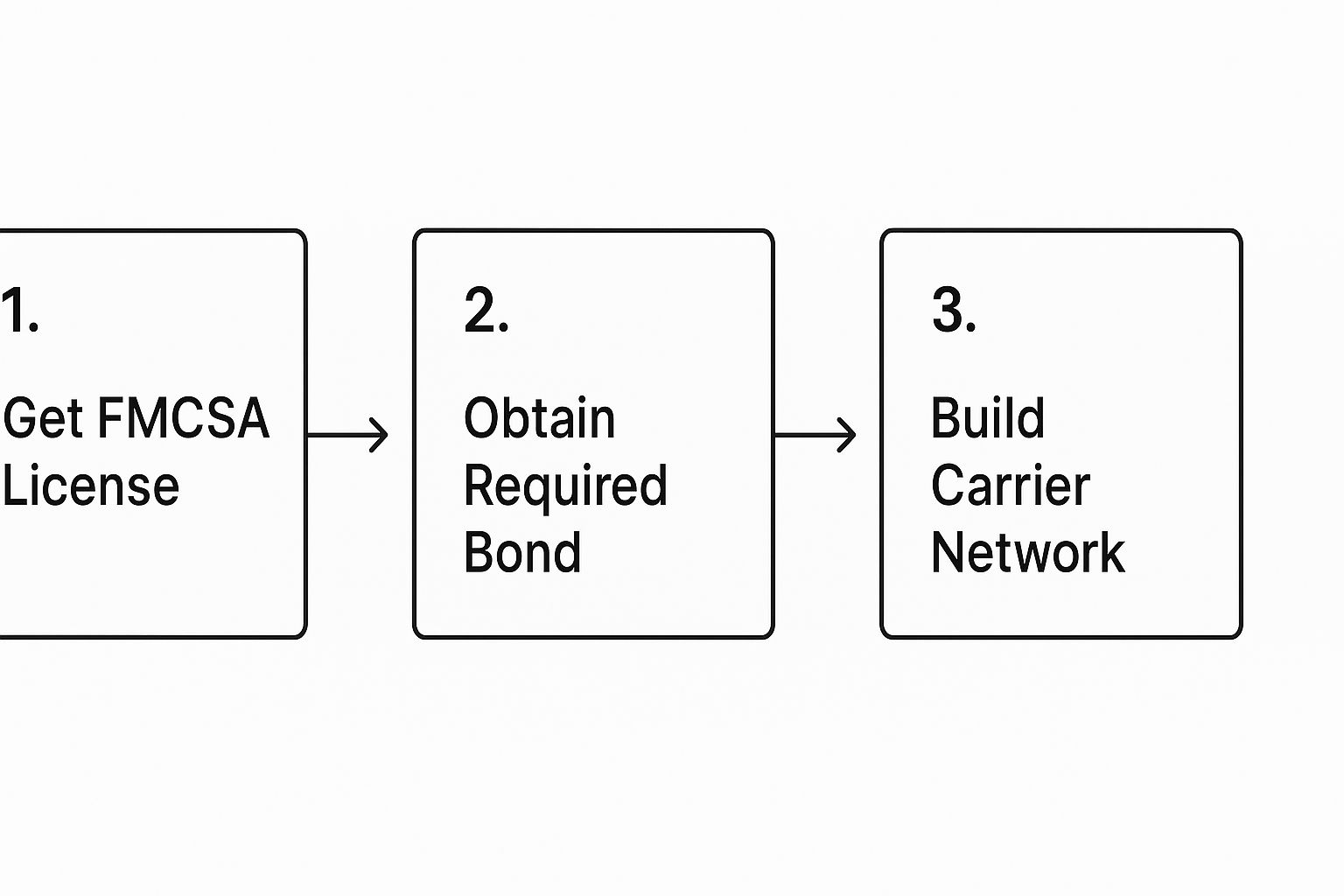Unsure what is a freight broker? Learn how they act as your shipping expert, finding the best trucks and rates to move your freight hassle-free.

Ever found yourself wondering how a business with products to ship connects with the right truck to move them? That's where a freight broker comes in.
Think of a freight broker as a matchmaker for the shipping industry. They are the essential link connecting a shipper (the company that needs to move goods) with a carrier (the trucking company that gets it there).
Let's use an analogy. Imagine you're planning a big, complicated vacation. You could spend days, or even weeks, trying to piece it all together yourself—researching flights, comparing hotels, and booking tours. Or, you could call a travel agent. They use their expertise and industry contacts to build the perfect trip for you, often saving you time, stress, and even money.
A freight broker does exactly that, but for your cargo.
Instead of your team spending valuable hours calling dozens of trucking companies to find one that's reliable, available, and fits your budget, the broker handles everything. They tap into their huge, pre-vetted network of carriers to find the perfect truck for your specific load. It doesn't matter if it's a full truckload (FTL) or a smaller less-than-truckload (LTL) shipment; they find the right fit.
To really get a handle on the broker's role, it helps to see how they fit into the bigger shipping puzzle. Every time a broker is involved, there are three main players working together.
Here’s a quick breakdown of who does what:
The broker's job is to make sure this three-way relationship runs like a well-oiled machine. They are the central hub—managing communication, negotiating rates, and coordinating all the moving parts so the shipper doesn't have to. You can learn more by reading the official definition of a freight broker in our detailed article.
This isn't just a niche service; it's becoming the backbone of modern logistics. The global freight brokerage market was valued at USD 54.87 billion and is projected to hit USD 98.73 billion by 2034. That's a growth rate of about 6.05% every year, which just goes to show how much businesses rely on these experts for smart, efficient shipping.
Ready to see how a broker can simplify your shipping?

Think of a freight broker as more than just a matchmaker. They're your on-demand logistics department, handling all the gritty details of shipping so you can get back to what you do best: running your business. Their job isn't just about finding a truck; it's about being a problem-solver, a tough negotiator, and a quality control specialist all rolled into one.
Let’s pull back the curtain on what a broker actually does. When you call them, they don't just book the first truck that pops up. They kick off a detailed process designed to protect your interests and your wallet, diving deep into their vast network to find the perfect carrier for your specific load, route, and timeline.
One of the most important things a broker does is vet the carriers. Let's be honest, handing your valuable products over to a trucking company you've never met feels like a massive gamble. A good freight broker takes that risk off the table by doing the homework on every single carrier they work with.
And this isn't just a one-and-done check. It’s a constant process to make sure every carrier is up to snuff.
This careful screening means you can rest easy knowing your freight is in good hands. It’s all about reducing your risk and heading off expensive problems before they even start.
So, besides keeping your cargo safe, what's a freight broker’s secret weapon? Buying power. Brokers move a ton of freight for lots of different clients, which gives them access to better rates than a single business could ever get on its own. They live and breathe the market, so they know how to get you the best possible price for every shipment.
A great broker acts as a buffer between you and the complexities of the shipping world. They anticipate potential roadblocks—from route changes to equipment issues—and solve them before they ever impact your delivery schedule.
Finally, they tackle the mountain of paperwork. Every load comes with booking confirmations, bills of lading, and delivery receipts. By taking over these tedious administrative tasks, they free up your team's time and cut down on the chances of a typo delaying a shipment or a payment. It's really that simple: they make shipping feel smooth, predictable, and worry-free.

So, why not just go find a carrier yourself? It’s a fair question, but working with a freight broker brings some serious advantages to the table—perks that are nearly impossible to get on your own. They don’t just move boxes; they help you build a smarter, more profitable supply chain.
When you bring a broker on board, you’re not just hiring another vendor. You're gaining a partner whose main goal is to dial in your entire shipping process. They give you instant access to industry knowledge, powerful tech, and a massive network that would otherwise take you years and a small fortune to build from scratch.
Let's break down what that really means for your business.
Let's be honest, one of the biggest draws is the potential for real cost savings. Because brokers are juggling a huge volume of shipments for all their clients, they have some serious leverage when it comes to negotiating with carriers. This means they can lock in bulk shipping rates that are far better than what a single business could ever hope to get.
A freight broker’s value is measured in efficiency. By handling the complexities of logistics, they free you up to focus on your core business operations, directly contributing to your bottom line.
This access to better pricing is a game-changer in a competitive market. Even in today's tough environment, where brokers are seeing tighter margins, their ability to play the market still saves shippers money. Many small-to-mid-sized brokerages operate on profit margins below 15%, which shows how hard they work to keep rates competitive for you. If you want to dive deeper, you can find great insights on the current brokerage market from the experts over at DAT.
Want to see what those savings could look like for you? Get an instant quote for your FTL or LTL freight and see for yourself.
Business is never predictable. One month you might be dealing with a sudden flood of orders, and the next could be quiet. A freight broker gives you the power to scale your shipping up or down whenever you need to, without the headache of scrambling for trucks at the last second.
Think about your e-commerce store during the holiday rush. Instead of you frantically calling around for available trucks, your broker just taps into their network and makes it happen. It’s that simple.
This kind of agility is only possible because of their incredible carrier access. A good broker has solid relationships with thousands of vetted carriers, giving you a ton of options for any scenario:
Having this deep network means you always get the right truck for the right job, right when you need it. By handing off this logistics puzzle, you get precious time back to focus on what you do best: growing your business.
Ever wondered what really happens after you click "get a quote"? The world of freight shipping can seem like a black box, but it's actually a well-oiled process designed to get your goods from point A to B without a hitch. Think of it as a clear roadmap, and your broker is the expert guide navigating every turn.
Let's pull back the curtain and walk through the entire journey, step-by-step, from your perspective as the shipper. You'll see just how simple shipping can be when you have the right partner handling all the moving parts.
The process breaks down into five distinct phases. Your broker takes the lead on each one, making sure your experience is seamless from beginning to end.
Request a Quote and Provide Details
Your journey kicks off the moment you ask for a shipping rate. You’ll share the key details—the origin and destination, what you're shipping (LTL or FTL), its weight, and any special handling needs. This information is the foundation for everything that follows.
Carrier Sourcing and Negotiation
With your details in hand, the broker taps into their massive network. They aren't just looking for any truck; they're hunting for the right one. They match your specific needs with a reliable, pre-vetted carrier, then they handle the tough stuff—negotiating rates, confirming insurance, and locking in the best possible deal for you.
Pickup Coordination
Once a carrier is locked in, the broker lines up the pickup. They become the central hub for communication, making sure the driver knows exactly where to be and when. This completely removes any guesswork and gets your freight on the road, fast.
Your freight broker is your single point of contact for the entire shipment. No more chasing down dispatchers or trying to get a driver on the phone. The broker manages all that communication and gives you clear, timely updates.
In-Transit Monitoring
While your freight is rolling down the highway, your broker is watching its every move. They actively track its progress, giving you regular updates and getting ahead of any potential bumps in the road, like bad weather or traffic jams. This constant oversight is all about giving you total peace of mind.
Delivery and Final Paperwork
Finally, your broker confirms the safe and sound delivery of your shipment. They then tie up all the loose ends on the backend, from collecting the proof of delivery to making sure all the paperwork, like the bill of lading, is squared away. This final step closes the loop on a successful, stress-free shipment. While a broker handles these logistics, you can explore the differences in our guide on the freight forwarding process.
This infographic shows you the groundwork a broker lays to build the network that makes this whole journey possible.

It’s a great visual for understanding the crucial compliance and networking that has to happen long before a broker can even start moving freight. It’s what ensures they can operate legally and effectively on your behalf.
If you picture a freight broker, you might imagine someone glued to a phone, buried under stacks of paperwork, and manually tracking shipments. While the goal—connecting shippers with carriers—hasn't changed, the way we get there has been completely transformed by technology. Today's powerful platforms are wiping out the old frustrations, making the whole process faster, smarter, and way more transparent.
Long gone are the days of waiting hours, or even days, for a shipping quote. Digital freight platforms like FreightQuotesNow use smart algorithms to deliver instant pricing for both your FTL and LTL shipments. You get a clear, competitive rate in seconds, letting you make business decisions on the spot.
This evolution from manual to automated has created a far more efficient and reliable shipping experience.
A modern freight brokerage platform is so much more than a simple quoting tool. Think of it as a central command center for everything related to your shipping, pulling every step of the process into one easy-to-use online space.
This all-in-one approach offers some huge advantages:
Technology transforms freight brokerage from a reactive service into a proactive partnership. Instead of just solving problems as they arise, a modern broker uses data to prevent issues before they happen, ensuring a smoother journey for your freight.
This tech-forward approach has a big impact on the brokers, too. With better tools at their fingertips, they can manage more shipments with greater efficiency, which is a key part of their success. In the United States, a freight broker’s pay often blends a base salary with commissions, with the average base hovering around $70,000 a year. Their commissions, typically 15% to 18% of the gross margin, are directly tied to how well they match shipments—a task made much easier by technology. You can discover more insights about freight broker salaries and see how performance shapes their earnings.
For shippers, this all adds up to a much better experience from start to finish. You can learn more about how this works in our deep dive into LTL freight brokerage. At the end of the day, technology gives brokers the power to offer a higher level of service, which saves you time, money, and a whole lot of headaches.
Ready to experience a simpler way to manage your shipping?
Even after getting the basics down, you might still have a few questions rolling around in your head. That's perfectly normal. Getting straight answers is the best way to feel confident about bringing a broker onto your team.
Let's dive into some of the most common questions we hear.
This is easily one of the biggest points of confusion in the logistics world. While brokers and forwarders both act as go-betweens, their jobs are fundamentally different. The easiest way to think about it is that a broker arranges the ride, while a forwarder often handles the freight itself.
Let's break it down even simpler:
So, while their roles can sometimes seem to overlap, a broker is focused on the transaction and a forwarder is often more involved in the physical journey of the goods.
You bet they are. This isn't the Wild West—the industry is federally regulated to make sure everyone is protected. To operate legally, every freight broker has to be licensed by the Federal Motor Carrier Safety Administration (FMCSA). This is a non-negotiable first step.
But it doesn't stop there. Brokers also have to prove they're financially sound. They're required to hold a $75,000 surety bond or trust fund. Think of this as a safety net; it’s there to make sure carriers get paid for the work they do. These regulations are in place for your protection, giving you confidence that you're working with a legitimate professional who won't disappear overnight.
It’s a fair question, and the answer is simple: they make money on the margin. This is just the gap between what you, the shipper, pay for the service and what the broker pays the trucking company to actually haul the freight.
Let’s say you agree to pay a broker $1,500 to move your shipment. The broker uses their network and negotiating skills to find a great carrier who will do it for $1,300. That $200 difference is the broker's gross margin.
That margin isn't just pure profit. It covers the broker's time and effort in finding and vetting a trustworthy carrier, managing all the logistics, handling the paperwork, and being on call to solve any problems that come up. In most cases, the money they save you on the freight rate and the headaches they prevent are well worth their fee.